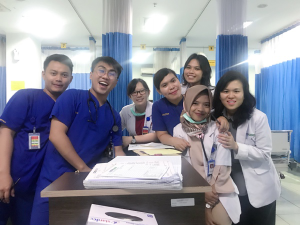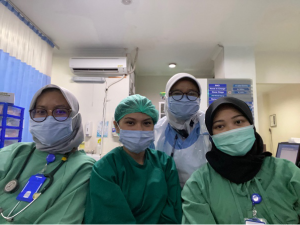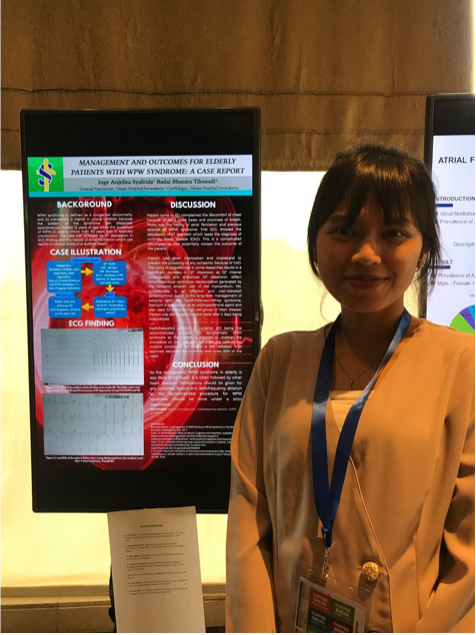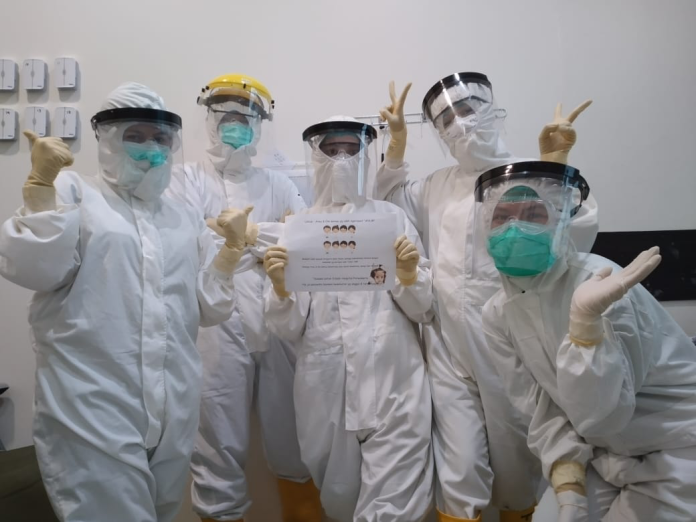Being a medical doctor, our contributor, Inge Syafrida is often asked about her motivation; leaving her busy hometown to a small city and dedicating herself to her work where she has to juggle her work-life balance between shifts. Inge’s love for cardiology has driven her to study Cardiovascular Science at University of Glasgow. In this article, she shares her struggle in being a medical student and how it leads to an enjoyment to become one.
It all started in 2011, approximately six months before my high school graduation. It was the time when all final year students had to decide which major or field they were interested in for higher education. I answered “medicine” without any doubt while the rest of the students chose other options. I guess medical field was not very popular in my school batch that year. One friend of mine even asked why I consider medicine as my major since it requires much time and effort.
There I was, underwent a placement in a hospital in Garut as part of my medicine study series in 2015. The hospital was always full of patients and cases I had never imagined as a girl from a big city not to mention sometimes I had night shifts after the default day works. One day a patient asked me why I did this; leaving my comfort zone to be somewhere I had never been before, having lack of sleep, facing a lot of people’s characters, encountering some non-science cultures that might be harmful to the patients. It took me some time to think but then I knew of what I love — being interacted and helpful to the people by all the things I have learned for over five years. I got my title as a medical doctor in 2017.
Another question raised when I worked in one private hospital as a doctor in the emergency room (ER). That afternoon one of the nurses in my team asked during our lunch break why I am interested in human heart since treating patients with emergency heart cases such as heart attack is time-consuming. A further question emerged about how would I pursue my dream as a cardiologist.


In tribute to science and my admiration for the human heart or cardiovascular in medical term, in late 2019 I decided to apply for postgraduate programme at the University of Glasgow. I chose the Cardiovascular Science course and got admitted in early 2020. My luck continued when I found information about the GREAT scholarship by the British Council as I attempted to apply and finally got it. I consider it is such an honour since I am the only Indonesian in my 20/21 class, so I promised myself to not mess things up and do my best. We have quite strict schedules in a week with some laboratory sessions within it although we need to switch some classes to be online due to the pandemic. Nonetheless, the course is nice. It offered very relatable topics about the heart, up-to-date guidelines of heart diseases, and some novel techniques I probably am not familiar with when I was in Indonesia.

Happy and easy journey? Not really. I rarely met friends because of lockdown regulations. I had been through a hard time in the first four months because there is a big difference between Indonesia and the UK education system. I am not lying when I said ‘C’ became my default grade that time. I got a lot of assignments with up to 1000 word counts or more and required evidence-based for every statement I made. It was tiring, yet I got this kind of strange satisfaction. Things gradually get better day by day as I started to adapt to my academic stuff. I used to spend most of my time with my flatmates but then I made friends with some Indonesian students and also my classmates. Here I am now, preparing my dissertation’s title.
What I noticed from all the previous inquiries was some people still believed in a stereotype about being involved in the Science, Technology, Engineering, and Mathematics (STEM) fields —medicine in my case— has to be super smart, incredibly organised. The rest thought it will be quite hard to balance between personal life and career due to heavy workload while in my age —I am 26 by the way— it is an ideal time to get married for most of Indonesian women. Even I am not going to deny that I used to think the same way about women in STEM before I am being part of it.
Here are my answers regarding those views. First, every field has its challenges, and it is necessary to present something valuable. As an example, models need to work out very hard to keep their bodies in a good shape. Musicians require high creativity and musical skills to produce good quality songs. Policemen have to miss Eid or Christmas with their families as part of their dedication to keep the citizens safe. My defense about the second stereotype is as long as I have a good support system such as family, partner, and friends, I do not have to choose between career or personal life. Why do I have to pick one if I can have them both? What matters is not about how early I start a marriage life; it is about how well I would prepare a proper life for my future little family. In term of physical, mental, and financial.
To sum up, my take-home message is taking a part in STEM is not as scary as some people thought. You do not have to be that ‘straight-A’ students, you just have to determine what you want so once you are in, you have this kind of commitment and fight for it no matter how hard or hurt it would be. Do not be afraid of failing, as Samuel Beckett said: “Ever tried, ever failed. No matter, try again. Fail again. Fail better.”
One day you are in STEM and people start to ask why, asked them back “why not?”
*All photo are provided by the author









